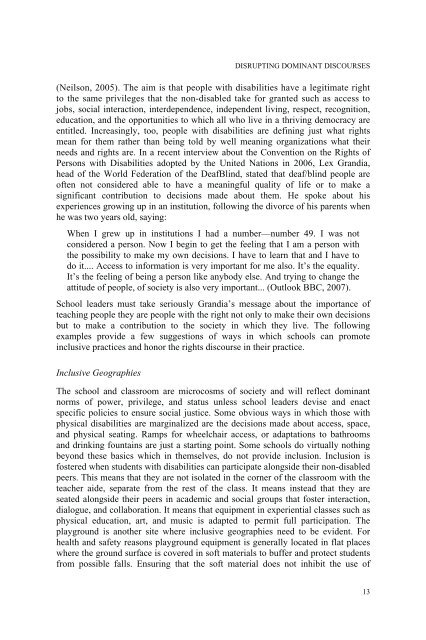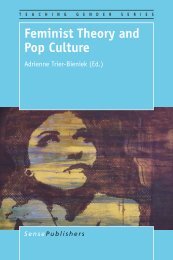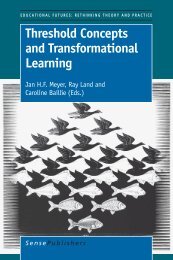Leadership for Inclusion
577-leadership-for-inclusion
577-leadership-for-inclusion
- No tags were found...
Create successful ePaper yourself
Turn your PDF publications into a flip-book with our unique Google optimized e-Paper software.
DISRUPTING DOMINANT DISCOURSES<br />
(Neilson, 2005). The aim is that people with disabilities have a legitimate right<br />
to the same privileges that the non-disabled take <strong>for</strong> granted such as access to<br />
jobs, social interaction, interdependence, independent living, respect, recognition,<br />
education, and the opportunities to which all who live in a thriving democracy are<br />
entitled. Increasingly, too, people with disabilities are defining just what rights<br />
mean <strong>for</strong> them rather than being told by well meaning organizations what their<br />
needs and rights are. In a recent interview about the Convention on the Rights of<br />
Persons with Disabilities adopted by the United Nations in 2006, Lex Grandia,<br />
head of the World Federation of the DeafBlind, stated that deaf/blind people are<br />
often not considered able to have a meaningful quality of life or to make a<br />
significant contribution to decisions made about them. He spoke about his<br />
experiences growing up in an institution, following the divorce of his parents when<br />
he was two years old, saying:<br />
When I grew up in institutions I had a number—number 49. I was not<br />
considered a person. Now I begin to get the feeling that I am a person with<br />
the possibility to make my own decisions. I have to learn that and I have to<br />
do it.... Access to in<strong>for</strong>mation is very important <strong>for</strong> me also. It’s the equality.<br />
It’s the feeling of being a person like anybody else. And trying to change the<br />
attitude of people, of society is also very important... (Outlook BBC, 2007).<br />
School leaders must take seriously Grandia’s message about the importance of<br />
teaching people they are people with the right not only to make their own decisions<br />
but to make a contribution to the society in which they live. The following<br />
examples provide a few suggestions of ways in which schools can promote<br />
inclusive practices and honor the rights discourse in their practice.<br />
Inclusive Geographies<br />
The school and classroom are microcosms of society and will reflect dominant<br />
norms of power, privilege, and status unless school leaders devise and enact<br />
specific policies to ensure social justice. Some obvious ways in which those with<br />
physical disabilities are marginalized are the decisions made about access, space,<br />
and physical seating. Ramps <strong>for</strong> wheelchair access, or adaptations to bathrooms<br />
and drinking fountains are just a starting point. Some schools do virtually nothing<br />
beyond these basics which in themselves, do not provide inclusion. <strong>Inclusion</strong> is<br />
fostered when students with disabilities can participate alongside their non-disabled<br />
peers. This means that they are not isolated in the corner of the classroom with the<br />
teacher aide, separate from the rest of the class. It means instead that they are<br />
seated alongside their peers in academic and social groups that foster interaction,<br />
dialogue, and collaboration. It means that equipment in experiential classes such as<br />
physical education, art, and music is adapted to permit full participation. The<br />
playground is another site where inclusive geographies need to be evident. For<br />
health and safety reasons playground equipment is generally located in flat places<br />
where the ground surface is covered in soft materials to buffer and protect students<br />
from possible falls. Ensuring that the soft material does not inhibit the use of<br />
13




